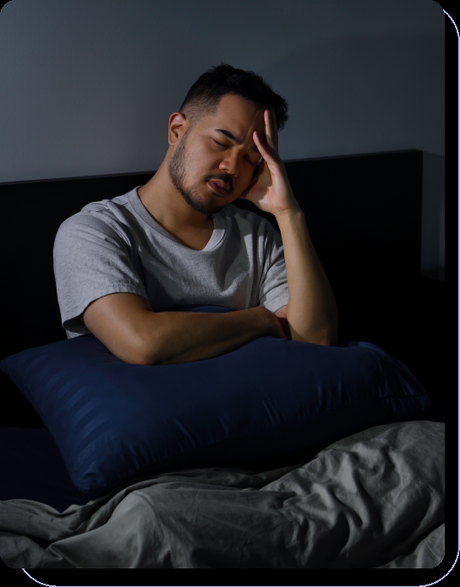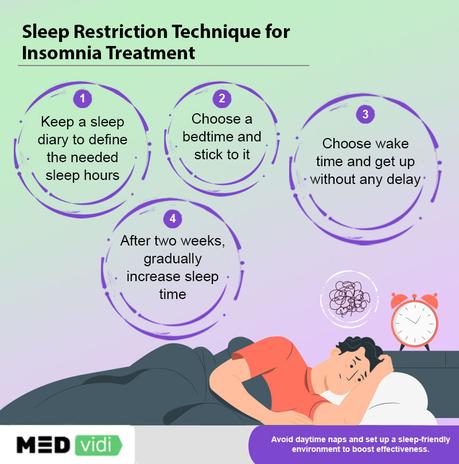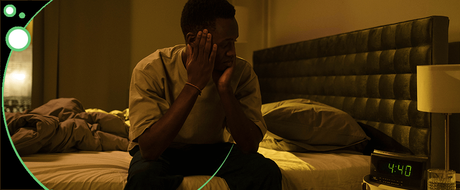Insomnia: Strategies & Benefits
- 15 March, 23
 Written by
Veronika Nepevnaya,
Written by
Veronika Nepevnaya, Medical Writer
 Medically reviewed
Dr. Umar Javed, MBBS
March 2023
Content
Medically reviewed
Dr. Umar Javed, MBBS
March 2023
Content
 Insomnia
Sleep Restriction Therapy for Insomnia: Strategies & Benefits
Insomnia
Sleep Restriction Therapy for Insomnia: Strategies & Benefits
Are you having trouble getting a good night’s sleep? You’re not alone. Millions of people around the world suffer from insomnia, a condition that can leave people feeling exhausted and overwhelmed. Fortunately, there is a solution—sleep restriction therapy.
A sleep hygiene technique called “sleep restriction” can help you get more restful sleep in less time. In this article, we will look at the tips for insomnia treatment and the potential benefits of this sleep therapy.
Begin your journey of managing insomnia at MEDvidi. Click the button below to consult our doctors online.
Book An AppointmentWhat is Sleep Restriction?
Sleep restriction is a form of cognitive-behavioral therapy for insomnia (CBTI). It involves limiting the amount of time spent in bed awake and increasing the amount of time spent in actual sleep. The goal of sleep restriction is to improve the quality of sleep and reduce the time it takes to fall asleep. It has shown clinical improvement in most cases.
Sleep restriction works by resetting the body’s natural sleep-wake cycle. When someone is suffering from insomnia, their body has become used to sleeping on an irregular schedule. Due to this technique, the body begins to recognize the new pattern and adjusts accordingly.
How to Implement a Sleep Restriction Plan
The process of implementing sleep restriction into your routine can be quite simple. However, consider consulting a doctor before starting this method to make sure it won’t harm you.
- Identify your sleep window. This is the number of hours you need to spend in bed for sleep. Typically, this is between seven and eight hours, depending on your lifestyle and individual needs. The next step is to calculate the total amount of sleep you will get in this time frame. Subtract the time taken to fall asleep and the time spent awake during the night from the total hours spent in bed to define the amount of time spent asleep.
- Set a strict wake time and bedtime and stick to it. First, you start waking up and getting up at the same time each morning, even on weekends, regardless of the number of hours you got to sleep. Then, you determine what time you have to go to sleep considering the waking up time and the number of hours calculated in the first step.
- Gradually increase the amount of time in bed each night. Stick to the sleep schedule for about two weeks. If you notice better and deeper sleep during the night but feel tired during the day, add 15 minutes to your sleep window. Finally, you will find the amount of time you need to sleep to feel good during the day as well. This may take a few weeks, and might also cause sleep disruptions initially but it is important to be consistent and not extend your sleep window too quickly.
- Avoid naps during the day. Napping can disrupt your circadian rhythm and make it harder to fall asleep at night. If you need to nap, try to limit it to 30 minutes or less and only take it in the early afternoon.
- Create a sleep-friendly environment. This includes setting a comfortable temperature, eliminating sources of noise and light, and avoiding caffeine and alcohol at least four hours before bedtime.
Our mental health specialists can develop a personalized treatment plan to help you overcome your insomnia symptoms.
Consult A DoctorBenefits of Sleep Restriction
- Decreased sleep latency. Sleep latency is the amount of time it takes to fall asleep. Its reduction can be achieved by limiting time spent in bed without sleep and sticking to this amount. For example, if you need eight hours of sleep, you would set your bedtime at 11 pm and wake up at 7 am. By doing this, you make your body become more efficient with the time it has. You can use a sleep time calculator for this purpose.
- Improved sleep quality. When the amount of time spent in bed is limited, the body is more likely to enter deep, restorative sleep to take as much as possible from those hours. This type of sleep is essential for the body to repair itself and process the events of the day.
- Boosted alertness. Deeper and more restful sleep can help you to wake feeling more refreshed, and therefore more awake and alert during the day.
- Better productivity and focus. By getting a good night’s sleep, you have more energy during the day and can stay more focused on tasks. Limiting the amount of time you spend in bed can better allocate your energy to the things that need to be done.
- Reduced stress. Many people struggle with stress and anxiety, and getting enough sleep is one of the best ways to cope. By enhancing your sleep, you can reduce stress levels, allowing you to be more productive and better equipped to handle challenging situations.
- Lost weight. Studies have found that people who get less sleep tend to be more likely to gain weight than those who get enough rest. This is because when you are sleep-deprived, your body produces more of the hormone ghrelin, which is responsible for making you feel hungry. Restricting sleep can help to keep your ghrelin levels in check.
- Enhanced overall health. Studies have shown that getting enough sleep can reduce the risk of developing certain health conditions such as high blood pressure, diabetes, and cardiovascular disease. Getting a sufficient amount of restful sleep can help to reduce your risk of developing these diseases.
Talk to an MD and find out what the most successful therapy for you is. Take control of your insomnia!
Book A Same-day Visit
Bottom Line
Sleep restriction therapy is typically recommended for people who have difficulty falling asleep and staying asleep. It involves limiting the amount of time spent in bed to only the amount of time needed for actual sleep, and not allowing any other activities, such as watching television or reading, in bed. This helps to create a strong association between the bed and sleep.
If you need specialized assistance with insomnia, MEDvidi is the right online mental health resource. Experienced medical doctors from your area will provide you with personalized guidance and create a tailored treatment plan to fit your individual requirements, including psychotherapy and medication.

Real help for Insomnia.
Beat your symptoms with our expert advice.





- Acute insomnia
- Insomnia
- Insomnia definition
- Insomnia treatment
